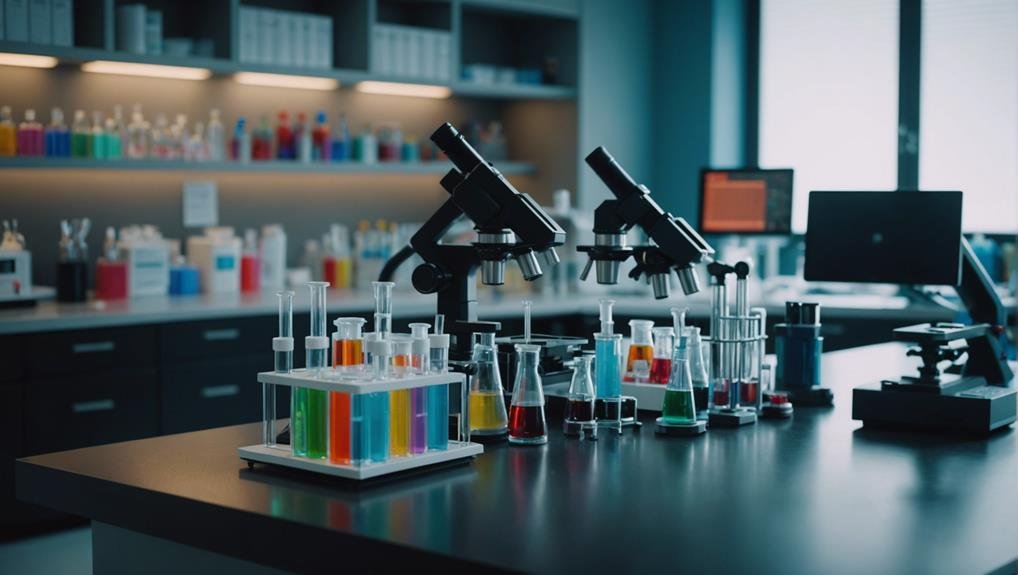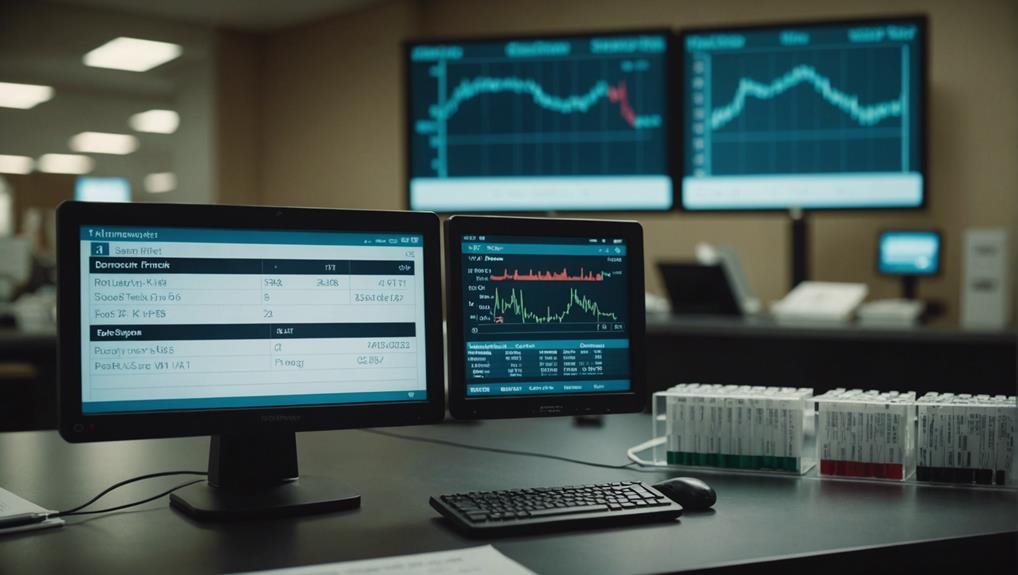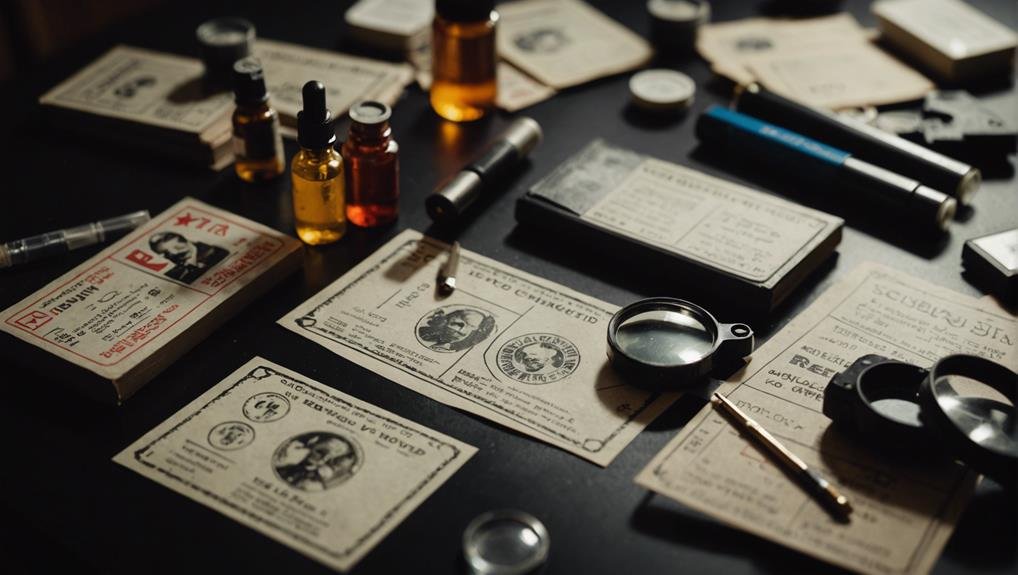Understanding the cost of different testing kits is crucial for making informed decisions. COVID-19 antigen tests typically range from $8 to $24 per kit, delivering results within 15 to 30 minutes.
Some of the links in this article may be affiliate links. If you make a purchase through these links, we may earn a small commission at no extra cost to you. Thank you.
On the other hand, molecular tests can cost between $20 and $40, offering PCR-quality accuracy. While antigen tests are more budget-friendly for frequent use, PCR tests, averaging around $62, provide greater precision.
It is important to note that insurance coverage for these tests may vary, with private plans and Medicaid often excluding coverage. To ensure accurate results, it is recommended to purchase testing kits from reputable vendors to avoid counterfeit products.
By considering these factors, individuals can select the most suitable testing kit based on their specific needs.
Types of Testing Kits
Testing kits vary in complexity and the contaminants they detect. Some kits use paper strips, while others use colorimetric reactions that change color when a contaminant is present. These kits are designed for quick and easy detection, suitable for various uses.
Rapid antigen tests, particularly at-home rapid tests, are popular for their convenience and fast results. These tests are affordable and provide quick outcomes. The cost per test depends on the technology and contaminants targeted. For example, some tests utilize colorimetric reactions for detection through color changes, while others use fluorescence under UV light for more accurate results.
There are also testing kits available for assessing water quality, determining metal presence, and estimating soil contamination. Each kit offers advantages like speed, portability, and ease of use. However, interpreting results accurately requires proper training and oversight. Understanding the different types of testing kits helps in recognizing their applications and cost considerations.
COVID-19 Antigen Test Costs
COVID-19 antigen test kits range from $8 to $24, offering a convenient and fast way to detect the virus at home. These kits provide quick results, typically within 15 to 30 minutes, making them ideal for regular testing or situations requiring immediate results.
Most kits include two tests, making the cost per test affordable, especially for families or groups. Popular options like Quidel QuickVue and Abbott BinaxNow are priced around $20 per kit, while Acon Flowflex is a budget-friendly option at $8.
It's important to note the following key points:
- Accuracy: These tests have a sensitivity of 84% to 93% for detecting the Omicron variant.
- FDA Authorization: Many kits are FDA-authorized for at-home use, suitable for individuals as young as 2 years old.
- Ease of Use: Following the manufacturer's instructions accurately is crucial for reliable results.
- Availability: These kits are widely accessible in pharmacies and online stores.
- Cost: Prices vary, with most kits falling in the $20 to $40 range for two tests.
Molecular Test Pricing

Molecular test kits, known for their high accuracy and quick results, are priced between $20 to $40 for at-home use. These tests are a reliable option for individuals needing fast and dependable results.
One notable example is the Aptitude Medical Systems Metrix, an FDA-approved at-home molecular test that delivers PCR-quality results in as little as 30 minutes to an hour.
The primary factor affecting the cost of these molecular tests is the per-test pricing, which includes the cost of the testing machine. Despite the initial investment, these tests offer a cost-effective solution for accurate and rapid testing at home, particularly crucial during times when swift diagnosis is essential.
Ongoing efforts are focused on reducing the cost of molecular test kits to make them more accessible to a wider audience. By lowering the per-test expenses, more individuals can benefit from the accuracy and convenience of at-home testing.
Investing in molecular tests not only saves time but also provides peace of mind through reliable results.
Insurance Reimbursement Options
When considering the financial aspects of at-home molecular testing, it's crucial to be aware of the insurance reimbursement options available to consumers. The landscape for these options has shifted, especially following the conclusion of the Public Health Emergency (PHE) on May 11, 2023.
- Private health plans: COVID-19 tests may no longer be covered at no out-of-pocket cost by private health plans. This change could result in higher expenses for each test kit.
- Medicaid coverage: In 18 states, temporary Medicaid coverage for COVID-19 testing has ceased with the end of the PHE. This change will likely impact the cost per sample for many individuals.
- Uninsured individuals: Those without insurance may face increased costs for COVID-19 testing. It's advisable to explore local resources for any available free testing options.
- At-home rapid tests: Reimbursement for these tests per member per month has ended post-PHE, potentially leading to higher expenses for individuals relying on at-home testing.
- Clinics: Some clinics may still provide free COVID-19 testing. It's beneficial to investigate community health centers or public health departments for assistance.
Understanding these shifts in insurance reimbursement can help in managing health expenses effectively, especially when considering the costs of various testing kits.
Cost Comparison: Antigen Vs. PCR

Let's compare the costs of antigen tests and PCR tests to help you decide which option suits your needs. Antigen tests are priced between $8 to $24 per kit, typically containing two tests, making them a more budget-friendly choice for COVID-19 testing. These rapid at-home tests usually cost around $11 per test, making them a cost-effective solution for regular testing.
In contrast, PCR tests have a higher average cost of $62 per test, offering greater accuracy but at a higher price point. While antigen tests are more affordable, with an average cost of $45 for outpatient clinical COVID-19 tests in 2021, PCR tests are known for their accuracy despite the higher cost per test.
Antigen tests are convenient and economical for frequent testing compared to PCR tests, providing a faster and more affordable option for detecting COVID-19.
When deciding between the two, consider your testing frequency and the importance of accuracy. For routine testing, antigen tests offer a cost-effective solution. However, if you require more precise results, PCR tests, despite being pricier, may be the better choice.
Tax Deductibility of Testing Kits
COVID-19 testing kits are considered deductible medical expenses, allowing for reimbursement through various accounts like FSAs, HSAs, HRAs, or MSAs. The IRS has confirmed that the cost of at-home COVID-19 testing, including purchasing testing kits, is typically eligible for deduction as a medical expense. This flexibility enables us to utilize our qualified medical accounts to cover these expenses, thereby easing the financial strain.
As per IRS guidelines, testing kits are classified as eligible medical expenses, presenting a valuable opportunity for us during tax season. Key points to note include:
- COVID-19 testing kits are reimbursable through flexible spending accounts (FSAs).
- Health savings accounts (HSAs) can be used to cover the cost of testing kits.
- Health reimbursement arrangements (HRAs) are an additional option for reimbursing testing kit expenses.
- Archer medical savings accounts (MSAs) can function similarly to FSAs and HSAs for covering testing kit costs.
- Personal protective equipment (PPE) expenses, which may encompass testing kits, are considered eligible medical expenses.
For a more detailed understanding of the tax deductibility of these items, IRS Publication 502 for Medical and Dental Expenses can provide comprehensive information. Familiarizing ourselves with these guidelines empowers us to make informed choices and maximize our tax benefits.
Counterfeit Test Warnings

With recent FDA warnings about counterfeit COVID-19 test kits, it's crucial to remain vigilant to avoid potential risks. These fake kits can give inaccurate results, leading to false negatives that could unknowingly spread the virus to others. This not only puts individual health at risk but also jeopardizes public safety.
The FDA recommends purchasing tests from reputable sources to steer clear of counterfeit products. These unauthorized kits often lack quality control measures, impacting their accuracy significantly. Without meeting the necessary standards, these tests may fail to detect the virus reliably, rendering them ineffective or even harmful.
To ensure accurate results, it's best to buy from trusted vendors known for adhering to strict guidelines and quality control measures. By staying cautious and well-informed, we can safeguard ourselves and others from the dangers associated with counterfeit test kits.
Prioritizing our health means opting for verified products that guarantee reliability in testing.
Best Time to Use Kits
To ensure timely testing for COVID-19, it's crucial to use test kits when experiencing symptoms or after being exposed to a confirmed case. Antigen tests and rapid covid tests are highly recommended in these situations due to their quick results and user-friendly nature.
Testing at the right moments plays a significant role in early detection and preventing the spread of the virus. This includes testing when symptoms appear, after exposure to a confirmed case, before and after travel, during community outbreaks, and for workplace safety reasons.
At-home testing is a convenient and accessible option, allowing individuals to test themselves without the need for a medical professional. While the cost per test can vary, the benefits of testing at critical times far outweigh the expense.
Conclusion
Understanding the costs of different testing kits is crucial for making informed decisions. Whether you're considering a COVID-19 antigen or molecular test, knowing the prices, insurance coverage, and tax implications can help you save money.
Comparing the costs of antigen and PCR tests can highlight significant differences. It's also important to be vigilant against counterfeit tests to avoid scams.
Proper timing and correct usage of testing kits are essential for accurate results. By staying well-informed, you can navigate the testing landscape more effectively and make the most cost-effective choices for your health and safety.

